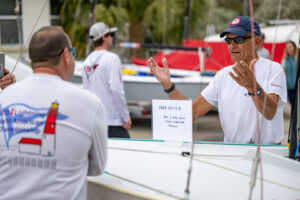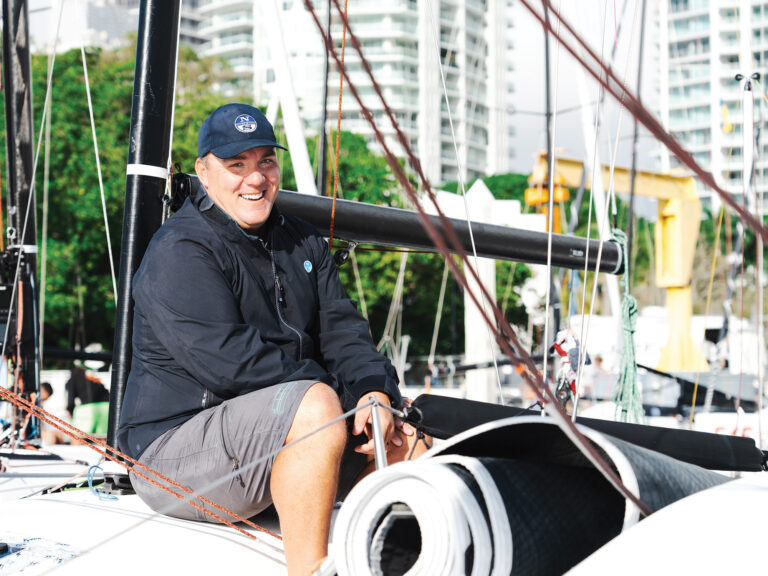
When Paul Elvström raced with Aage Birch for the Dragon Gold Cup at Marstrand, Sweden, in 1958, he decided that Sergio Sorrentino, of Italy, was the fastest and that they were the next fastest. The Cup would be won by whoever won the final race, and on the final beat of that race, they alternately crossed each other until, “by pure luck,” according to Elvström, Sorrentino crossed the finish line ahead.
“When things go like that, and it is luck who would win, then we know that and we don’t have to be disappointed,” he said. Elvström’s confidence, his trust in himself, his remembrance of all the times
he had won, assured him that he should have won, that only luck could enable a competitor to beat him!
The attribution of an outcome to luck is a means of expressing an unwillingness on the one hand to assume responsibility for a success or on the other hand to take the blame for a mistake. But it is also a means of retaining power. It’s not that I lost control and that you controlled me; it’s just that this time luck [a higher power, totally unrelated to me or you] usurped my usual control.
We give lip service to the fun of participating in a story filled with surprises and of accepting the role of luck in the outcome, although our actual purpose—disguised, deep down, hidden from view—is to control the entire game and to beat the hell out of our opponents. (Just don’t let anybody know.) We do not actually believe in luck, but we know that it’s better to have luck on our side than against us.
The confident feel lucky; they presume that things will go their way. And expecting the best, they assume that whatever has happened has happened for the best. They rig the past to make themselves look good and after a mistake or a failure they proceed to get on with the race and the series without undue condemnation. Free of preoccupation with irrelevant matters, they are alert to what does matter.
Research shows that bronze medal winners are happier than silver medal winners: silver medal winners regret just missing the gold while bronze medal winners relish just making the podium.
Richard Wiseman (The Luck Factor) compared the lucky with the unlucky and found that the lucky used such counter-factual thinking to ease the impact of misfortune, seized chance opportunities, were pleased by their condition (whatever it was), and presumed that they would be fortunate. He found that the unlucky missed opportunities because they were preoccupied—with the past, with the future, with their inadequacies, with feeling unlucky—while the lucky saw the opportunity that was there. Luck goes to the confident, those who feel lucky.
Of course, our inability to predict the course and outcome of an event does not mean that it was determined by luck. If we could feed all the variables into a computer of sufficient capacity, it could predict every vicissitude of an event and the finishing position of every competitor. Just because we cannot predict precisely when a wind shift will reach us, or whether a lineman’s shoulder will be forced to the left or the right as he is hit, or that a golf ball will land on a pebble that deflects it to the right, does not mean that such events are not predictable. It merely means that we cannot predict them. We deny predetermination because it conflicts with our wish to be in control of, rather than to be controlled by, predictable events.
However, we like to believe we have free will and that we, if not in control, at least have the capacity to be in control, and that luck explains whatever we fail to control. Instances abound of coincidences and surprises that seem to justify these presumptions and account both for the acceptance of luck and its frequent utilization as a psychological defense.
Consider, for instance, the luck involved in the winning of the Olympic gold medal in the Dragon Class at Kiel, Germany, in 1972. Afer the racing was over, John Cuneo, wishing to show his appreciation, invited the team meteorologist to come aboard his boat to see how he had used the plastic overlays that the met man had provided. But the met man was horrified to find that Cuneo had won the gold medal by overlaying his daily wind predictions on a deck mounted chart, upside down!
Consider the start of a race in the U.S. Soling Championships on Biscayne Bay, Fla., in the 1970s. I approached the line on port intending to tack ahead of Buddy Melges, to start on starboard tack at the pin and to go left. But Melges bore away, forced me to go astern of him and to start on port. I found a hole in the fleet of starboard tackers and, all alone, headed right. I was the first to reach a progressive velocity veer in the strengthening sea breeze, rounded the weather mark with a big lead, won the race easily, and beat Buddy, who had sailed as I had intended to do, to the left and away from the shift.
Consider that Stig Winnerstrom won the Soling European Championship at Alassio in 1975 by winning or finishing in the top 10 of the 80-boat fleet in five races, the only five, of the 20 races that were started, that finished. In the other 15—those that in the prevailing light air were cancelled before the first boat reached the first mark or that ran through their time limits— Winnerstrom had been far astern.
Sailboat racing, because of its marked complexity, is more subject to unpredictability, surprises, and fun, the variations that are often termed luck, than almost any other sport. The factors that vary the length of the course sailed, the speed of the boats, and their relationships when they meet are not predictable by the participants more than 60 percent of the time. The losers of sailboat races, not wanting to admit that they were controlled by the winners, will tell you that racing is all a matter of luck. The winners will tell you that sailboat races are won by strategy, speed and skill—by control—and that luck has nothing to do with it.
Luck, or destiny, or fate can also be used as a scapegoat. When a straight denial seems insufficient, luck can be used on either side of our ambivalent approach to competition. This device is called rationalization, or better, irrationalization, as it is irrational to believe, as many do, that luck explains the outcome of human interactions.
If we are fearful that someone will notice our excessive interest in control, we point to luck. “I wouldn’t have won, if not for – – – . We were just lucky.” Or if we are fearful that someone will notice our inability to attain the control we seek, we also point to luck: “It wasn’t our fault; we were just unlucky.” The concept of luck is so deeply ingrained and so widely accepted that its attribution, no matter how irrational, is typically considered rational and is accepted. And because we all have the same need to excuse our drive to control and to attribute our success or failure to something other than our efforts to attain control, we have a mutual interest in accepting the concept.
At Merion, at the age of fourteen in his First U.S. Amateur Championship, Bobby Jones played so impressively that Grantland Rice said, “He is the most remarkable kid prodigy we have ever seen.” But a few years later Bobby remembered his quarter final defeat: “I felt I had been badly treated by luck. I had been denied something that was rightfully mine.” Control was what he had demonstrated, what he had sought, and what he was unwilling to admit he had lost. Rice aided and abetted the irresponsibility by writing that Bobby’s missing a third birdie putt in a row “would have broken the heart of any golfer alive.”
Our inability to control every aspect of our games does not justify the presumption that the outcome was preordained by luck or some higher power. Achilles’ belief that the gods had determined his fate was not a rational excuse for sulking in his tent. There are enough variables in any sport to ensure that, no matter how skilled and competent the attempt, no one will ever be able to predict or predetermine its course and outcome completely. That, of course, means every sporting event contains surprise and unpredictability, and surprise is what makes sport fun and some sports more fun than others.









